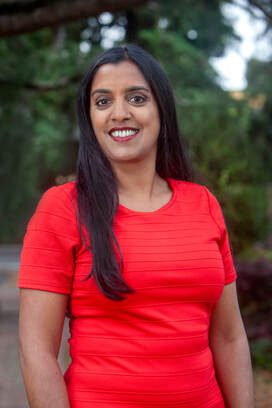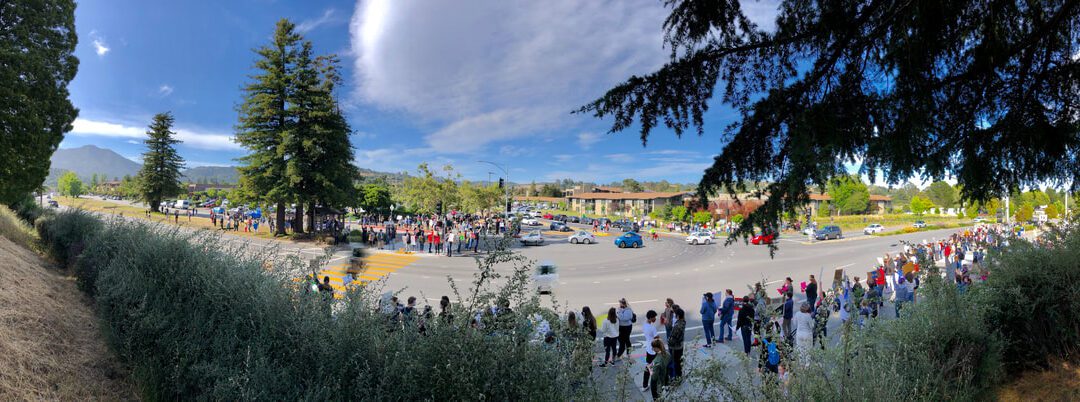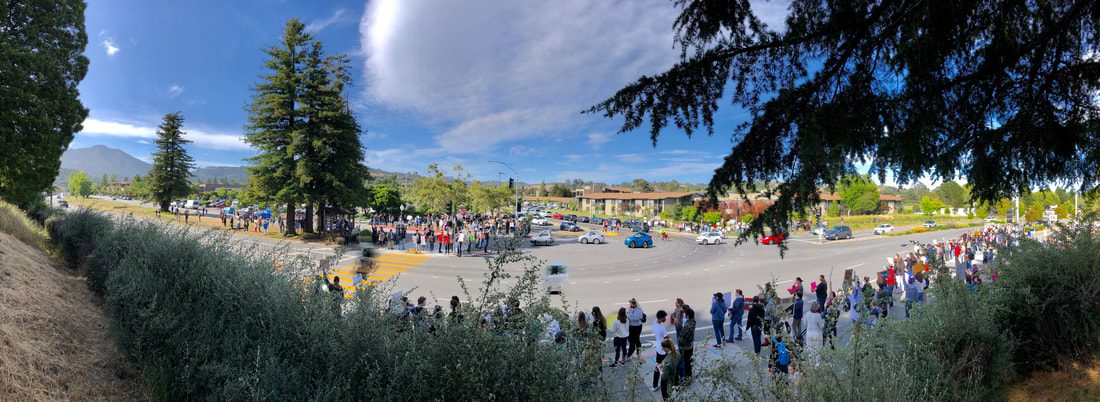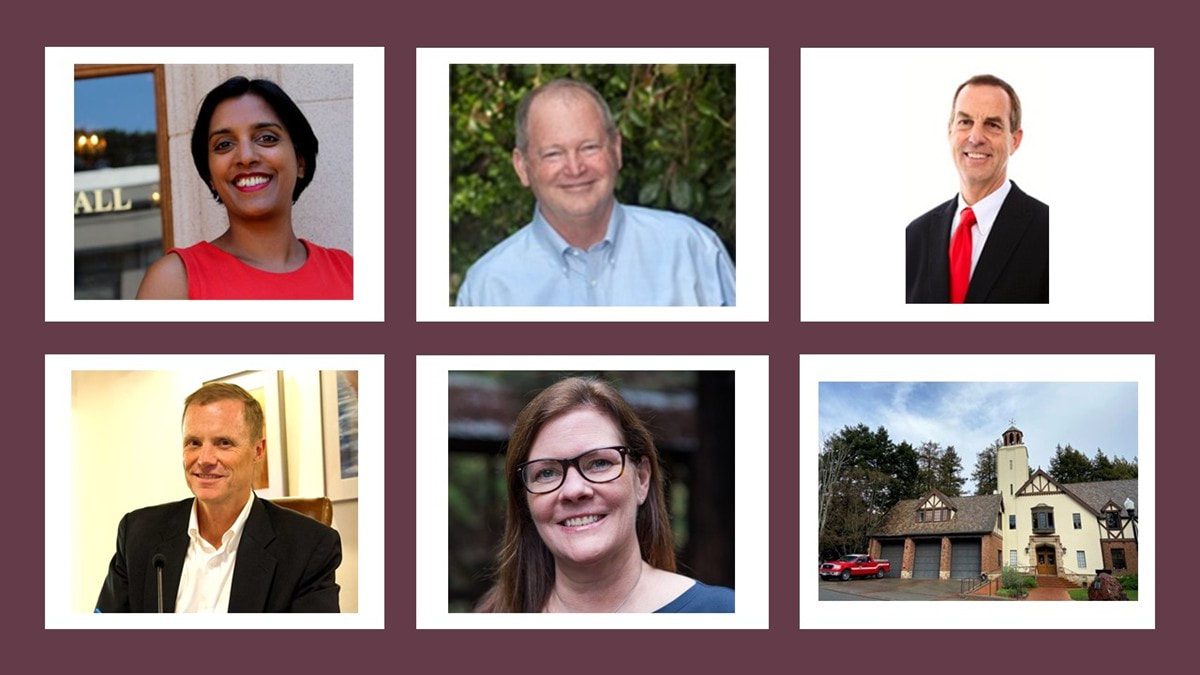 Mill Valley Mayor Sashi McEntee.
Mill Valley Mayor Sashi McEntee.
They’ve attended multiple listening sessions with constituents, got an earful at local protests and rallies, consulted with past Mill Valley mayors and councilmembers and crafted a strong statement in support of BLM and promised tangible action to come.
On Monday, that work began, with more than 300 listeners watching closely as councilmembers dove deeply into an array of recommendations directly from the community and committed to a range of next steps, including turning that statement into a resolution that the council plans to approve in July (MORE INFO HERE).
In doing so, councilmembers exhibited diligence and a seriousness of purpose that matched the community outcry arising out of McEntee’s misstep. Mill Valley resident Patricia Kittredge noted that McEntee’s blunder might have brought an unexpected benefit to the community.
“If that mistake had not been made, we would not stand as strong as we are now,” she told the council and hundreds of listeners online. “Her mistake was a wake up call for us as well – it was a blessing in disguise.”
McEntee kicked off the virtual town hall-style meeting with an apology.
”I’m sorry – I didn’t convey my true feelings in the moment,” she said, noting her place as the first person of color to serve as mayor in Mill Valley’s history. “I am a dark-skinned woman whose parents came to this country from Sri Lanka, a country torn apart by ethnic civil war. I am committed to doing anti-racism and justice work in this community. Tonight is just a beginning – let us be ready to do the real work.”
“There are a lot of people reeling from the news of still more deaths (like that of Rayshard Brooks 18 days after Floyd),” she continued. “All of us need to make space for more stories and more voices. It’s going to be uncomfortable.”
As a starting point, McEntee pointed to President Barack Obama’s four-point call to action, via his My Brother’s Keeper Alliance, for mayors, city councils, and police oversight bodies to address police use of force policies:
1. Review your police use of force policies.
2. Engage your communities by including a diverse range of input, experiences, and stories in your review.
3. Report the findings of your review to your community and seek feedback.
4. Reform your community’s police use of force policies.
“From what I see, Mill Valley is ready to make those changes,” McEntee said. “I believe in Mill Valley and I am ready to stand with you and do this work.”
Each councilmember followed with their own mea culpa for not catching the insensitivity on June 1 in the moment.
“The public has provided us with excellent ideas and it’s our job to listen and reflect and make change happen,” Vice Mayor John McCauley said.
“I want to be a part of a new structure that elevates the voices of black people in our community,” Councilmember Tricia Ossa said. “I recognize the immense privilege I have as a white woman in Mill Valley, and I have become more aware of disparities in our community.”
“I can try to empathize but I have no idea what the black experience must be like in America,” added Councilmember Urban Carmel, pointing to data that overwhelmingly indicates massive gaps in income, incarceration rates and the likelihood of dying from coronavirus, among many others. “From the stories that I have heard in our community, we live in two different Americas and two different Mill Valleys.
“We have not been paying attention and not living up to the values we espouse,” he added. “The challenge for this council and community is to finally change that narrative. People are frustrated and they are done with excuses. Every person in our town needs to feel safe and equal.”
For the bulk of the next several hours, the council turned the event over to the community for comments, both spoken and submitted digitally. Despite the coronavirus-era oddity of audio comments coming from digital devices scattered throughout 94941 and beyond, the sequencing was relatively smooth, and the vast majority of comments moved the conversation forward. Scroll down for a sampling.
Actions Speak Louder Than Words
The Council agreed that the task force include people outside city limits, specifically Marin City. “The task force needs to identify all of the things that we’re not going to come up with on our own because most of us are not people of color,” Carmel said.
The Council then went through a long list of suggestions, both within City operations and areas beyond direct City governance where the City could influence and/or partner with other government agencies or organizations.
Police
That process started with the Mill Valley Police Department, for which there were 22 recommendations, including transparency on instances of MVPD’s use of force and complaints against officers, as well as information on traffic stops and crime statistics.
“There is nothing on this list that I would take off the list,” McCauley said. “Everything is on the table.”
Those suggestions, available here, included an analysis of how MVPD policies compare with that of the recommendations of #8cantwait, a data-driven campaign to bring change to police departments and reduce the number of deaths and injuries related to interaction with police.
“This is a serious effort that deserves our focus,” McCauley said.
It also included exploring a council-added recommendation of seeing how Law Enforcement Assisted Diversion (LEAD), a community-based diversion approach with the goal “reducing unnecessary justice system involvement of people who participate in the program.
“Maybe there are times when you might not need to send a police officer on a call,” McCauley said, noting that, given the small size of MVPD with just 22 officers, the City would need to lean on the Marin County Sheriff’s Office. “I would like to see if we can operationalize this as a county.”
The Council recommended that the police department make its 734-page policy manual more accessible to the public.
(Focusing on existing police department policies) is obviously the most immediate thing that needs to happen,” Carmel added, noting the need to dig into the department’s budget and making sure it is money well spent. “What is our spending relative to other counties? Is it normal as a percentage of our revenues? Some basic benchmarking on our spending on the police force.”
McEntee noted the City’s recent move toward shared police services with Sausalito and need to explore other regional approaches.
Housing
“It’s a very difficult situation,” said Carmel, who serves on the City’s Affordable Housing Committee with McCauley. “Mill Valley is a very built-out environment – there’s very little land that’s available aside from areas we’ve got along Miller Avenue.”
That said, the council did approve, in 2017 an affordable housing ordinance in 2017, an attempt to combat the growing shortage of workforce housing in the area. The law requires 25 percent of homes in new developments with four or more units be rented or sold at “affordable” rates. It also levies a 1 percent fee on construction projects that cost more than $100,000, with the money going into a fund to support affordable housing initiatives.
“Our town has worked really hard on this,” McCauley said, pointing to the 25 percent requirement, calling the lack of progress to date frustrating.
Carmel urged affordable housing advocates to attend upcoming meetings on the subject. “I can tell you that the people who are opposed to (affordable housing), they will be there.”
McEntee said the City should work with the County of Marin on language around racially restrictive housing covenants, both historical and current, “not removing them entirely but record the document and issuing a new document that repudiates them,” according to a recommendation from Assistant City Attorney Inder Khalsa.
Schools
While merging the Sausalito-Marin City and Mill Valley school districts is outside the jurisdictional purview of the City, councilmembers expressed a willingness to raise awareness and public pressure on opportunities for greater integration of students at younger ages to foster familiarity.
“Let’s understand what the barriers are there,” Carmel said. “It could go a long way towards fostering inclusion in our society at a younger age for both young parents and young children.”
Mill Valley Recreation & City Services
The Council also expressed support for increased inclusivity at places like the Mill Valley Community Center, specifically by offering the same fee structure to residents from unincorporated Mill Valley and outside city limits.
Arts & Culture
The council expressed support for an array of cultural initiatives, including a massive “Black Lives Matter” street painting – with 16 artists each creating one letter within the phrase, as has occurred in many American cities – at the intersection of Miller Ave. and Camino Alto. The Arts Commission is set to dive into the project soon. The council also supported an oral history project on the history of the African-American community in Mill Valley and southern Marin, as well as using the Downtown Plaza as a forum for BLM speaker series “where the conversation can continue,” Councilman Jim Wickham said.
The Road Ahead
The council also agreed to turn its recent statement in support of Black Lives Matter into a resolution, which carries additional weight, they said.
At the conclusion of the event, councilmembers expressed a willingness to revisit its standing policy on not addressing matters raised within public open time, from which the massive controversy originated when McEntee didn’t treat the inquiry with the seriousness it deserved.
“There’s room for us to be a little less formal and a little more interactive,” Carmel said. “When people ask questions, we should answer them, and if we don’t know the answer, we’ll promise to get back to them in a short period of time. We don’t have to be too worried about being engaged in discussion with people in this community and getting into trouble.”
“We have very broad discretion about what is a local or national issue,” he added. “When there is an important thing going on, we shouldn’t be afraid to comment on it. We are the mouthpiece for our community and we shouldn’t be afraid of using it.”
They also expressed broad support for McEntee.
“If I felt that she had no commitment to addressing this task, I would’ve said that she should step down,” Wickham said. “But Sashi has shown her willingness to work at this and this is not the time for us as a council to take out a fellow councilmember over a five-second sound bite. This is how we can make changes. We recognize our mistakes and we move forward and become better people.”
“A lot of former mayors have made big mistakes early on in their terms,” Carmel said. “The reality is that this is a hard role and we were not necessarily prepared to deal with it, especially with a 100-year pandemic, a 100-year recession and a 60-year civil rights action taking place. That is a lot to take on. As long as we are resolved to do better and really listen and take advice from other people on the council and the community, we’ll be better off going forward.”
“I appreciate hearing from your compassion and understanding and your ability to really take the bigger picture and help me to grow as mayor and help us grow as a council,” McEntee said. “I hope we can work together to mend the wounds in our community.”
Voices Carry
MVCAN co-founder Eileen Fisher to the council: “We will be watching you. Reforms are not good enough. Serious and structural change must occur. There must be a truth and reconciliation process in Mill Valley.”
Fellow MVCAN co-founder June Cooperman: “The local education system from kindergarten through high school has failed children of color in Mill Valley on so many levels. This has hit me very hard. We are asking the council to work with the Tam Union High School District to elucidate the problems we have and generate comprehensive solutions to them.”
Emily Ulhorn, board of trustee, Mill Valley School District: “We as a district have our work ahead of us to undo systemic racism in our district. We will start by acknowledging systemic racism. Our board stands ready to collaborate and share resources with the Sausalit-Marin City School District. We believe that working together will provide better outcomes for all children. The ultimate decision lies with voters in these districts.” FULL LETTER HERE.
Seniors for Peace: “We know that true racial justice is not achievable by a task force with short term goals and low expectations.”
Jasson Minadakis, artistic director at Marin Theatre Company: “Our mission is to present new American plays and more than half of our work focuses on BIPOC playwrights and artists. We have a national reputation for doing so. We can only do this important work in this community if Artists of Color and Patrons of Color feel safe and respected here, on the streets, in our schools when they perform, in our businesses, and in their homes for those who choose to live here. I am here to say that Mill Valley has NOT achieved that goal. I know this from the first-hand accounts of their treatment that Artists of Color working with us have brought to me, and I am confident that there are many instances that they have not revealed, because suffering indignities—being questioned why they are here, being followed, being insulted and even threatened—are unfortunately par for the course in white communities for them. MTC wants to work with the City officially, including with its public safety officers, to ensure the safety and respect of Artists and Patrons of Color in Mill Valley. We want a direct line to public safety officers who will look out for and protect our artists and patrons. We want the community of MV to know that they can come to our productions to experience the empathy that is theater’s beating heart. The City Council needs the experience we have as the Council moves to address racism and prejudice in our community, especially the implicit and under-the-surface kind that exists through bias, White-favoring structures and white authority.”
Kress Jack, a longtime local business owner and Mill Valley resident, told the community about a new nonprofit she and others have started called Raise the Frequency. “It is about how, out of the pain and disgust, our fellow humans are underserved. We as a community have been called to action to make a change. Our vision is to provide safe inclusive spaces without discrimination.” Jack said it is crucial for the city to allocate funding towards events and programming specifically focused on inclusion, from waivers on city facility rentals to speaker and entertainment fees. “We want to engage with you to create a more just reality for more members of our community.”
Antonina Markoff, principal at Markoff/Fullerton Architects: “Like others do, I support you and our community to be boldly anti-racist. To that end I want to specifically call on you to openly identify and remove and remediate the structural racism that persists in our city and it’s regulations that benefit white people and oppress black people and to make common-cause with our neighbors and the County to do the same. Structural Racism takes many pernicious forms. I want to particularly call out Structural Racism as is manifest in Zoning regulations. This section “2.5 Zoning” from the 2020 Marin County Analysis of Impediments to Fair Housing Report explains: Zoning refers to regulations related to the use of land and land development in specific areas within a city, town or county. Zoning regulates building density and height restrictions, property lot sizes and the placement of buildings on lots. They also designate residential, commercial and industrial districts and determine the type of housing allowed within communities. Exclusionary zoning practices, including those that limit where, how, or if affordable housing can be developed, can result in creating and maintaining segregated communities.”
Former City Council candidate Max Perrey slammed Mill Valley and Marin for its dubious track record on racial disparities and income inequality. “It has been too easy for too long to pretend that the inequities that we are all seeing don’t exist.”
Joan Steidinger said that “one of the things that all of us white people in Mill Valley need to do is to apologize and acknowledge the depth of the pain that African-Americans and people of color have experienced over many years.”
Amy Haven praised the overall tenor of the event, saying “the respect and mindfulness has been really powerful to hear.” She said that while affordable housing was necessary, it wasn’t the first step towards a more inclusive Mill Valley. “People of color need to feel safe and supported in Mill Valley. We need a permanent coalition to see how Mill Valley can truly diversify.”
Wesley Cabral said he would “love to see us as a community have some serious conversations about we might reallocate the budget of the police department or disband it completely,” and to “see if we can reduce the police budget in half and free up about $3.5 million and put it in other areas, with more attention to mental health and social services and education. School teachers should be making more than police officers.”
Longtime local affordable housing advocate Dennis Klein lambasted the council: “for over 30 years, Mill Valley has failed to build affordable housing, “perpetuating the discrimination that has been made highly visible by themurder of George Floyd.”
“We as white people have to look in the mirror and understand what we don’t know and how we are complicit with the situations we are trying to solve,” said Jasmine Gavam. “We all have work to do and we need to do so at a very personal level. You might want to consider hiring a chief diversity officer and hold up the mirror to you all.”
Jake Cohen, a Tam High student, told the council that “we’re stuck on this treadmill of reform” when police simply needed to be defunded, with resources allocated elsewhere, to areas like social services with 911 getting triaged depending on the situation. “The public should have access to all records of complaints filed against police,” he said. “This job holds too much power.”
Hilary Heaven told the story of her grandfather, Dr. Daniel Collins, who first tried to buy his house at 700 Summit Ave. in Mill Valley during the early 1950s but was prevented from doing so by a deed restriction preventing the sale to a black man. Collins, who died in 2007 at age 91 at The Redwoods, eventually convinced the owner to sell the house to him, but only after a battle. “That’s the thing about being black in this country,” Collins told the Marin IJ in 1995. “You don’t know how the hell a white person is going to treat you.” Collins was also the first black professor at the University of California at San Francisco’s School of Dentistry and one of the first black men in the country to serve on corporate boards. He also helped create what is now known as Lifehouse, a residential and counseling center for people with developmental disabilities located in San Rafael. Heaven, who has a 14-year-old child in the Mill Valley School District, urged the council to get behind efforts to merge the Sausalito-Marin City and Mill Valley school districts. “Diversify the school system earlier so that families and children get to know each earlier and interact.”
Elan Morpurgo: “People are talking about defunding the police. It’s a lovely idea. Maybe instead of defunding them, we could unarm the police. If you take the weapons away from the police, it would be less money and the police would be very grateful for not carrying all of this ammunition. They look like a Mack Truck with all of the ammunition on them. Be a peace force and not a war force.”
Tiffany Parker: “We have experienced so much prejudice and racially targeted profiling here in Mill Valley. It’s so deep-seated in this community and it starts at home. We’re missing the mark.” Parker pointed to a “Straight Outta Compton”-themed Edna Maguire fifth grade graduation party. “A room of 14 white moms and not one of them thought this was inappropriate,” she said.
Menden Kibera, one of the creators of the Change.org petition calling for McEntee’s resignation: “We still feel like she’s falling short. We’re so proud of everyone. And I’m impressed by Urban. He showed up after doing some homework. We want to be able to raise our kids here and feel like we’re part of the community. I’m pretty ashamed to be a member of this city. I really hope you guys are listening and ready to take action. I am not backing down and I hope you are committed to doing this work.”
Here and here and here and here are dozens of additional comments submitted by email.



